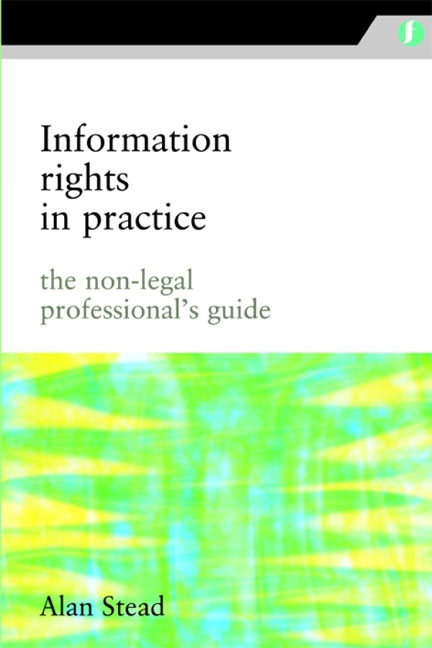Book contents
- Frontmatter
- Contents
- Acknowledgements
- Table of statutes and case law
- Abbreviations
- 1 Introduction
- 2 Data Protection Act 1998
- 3 Definitions of personal data
- 4 The scope of the Data Protection Act
- 5 The data protection principles
- 6 Access to personal data
- 7 Data sharing
- 8 The Freedom of Information Act 2000 and Environmental Information Regulations 2004, SI 2004/3391
- 9 Scope of the Freedom of Information Act 2000 and the Environmental Information Regulations 2004
- 10 Application of exemptions and exceptions
- 11 The public interest test
- 12 Publication schemes
- 13 Compliance, the Information Commissioner and the Information Tribunal
- 14 Disclosure logs
- 15 Records management – Section 46 code of practice
- 16 Other legislation
- 17 Interaction of the legislation
- 18 Summary
- Appendix 1 Data protection principles
- Appendix 2 Flow chart of FOI
- Appendix 3 Exemptions and exceptions under the Freedom of Information Act 2000 and the Environmental Information Regulations 2004
- Appendix 4 Bibliography and useful web addresses
- Appendix 5 Published standards for records management
- Index
9 - Scope of the Freedom of Information Act 2000 and the Environmental Information Regulations 2004
Published online by Cambridge University Press: 09 June 2018
- Frontmatter
- Contents
- Acknowledgements
- Table of statutes and case law
- Abbreviations
- 1 Introduction
- 2 Data Protection Act 1998
- 3 Definitions of personal data
- 4 The scope of the Data Protection Act
- 5 The data protection principles
- 6 Access to personal data
- 7 Data sharing
- 8 The Freedom of Information Act 2000 and Environmental Information Regulations 2004, SI 2004/3391
- 9 Scope of the Freedom of Information Act 2000 and the Environmental Information Regulations 2004
- 10 Application of exemptions and exceptions
- 11 The public interest test
- 12 Publication schemes
- 13 Compliance, the Information Commissioner and the Information Tribunal
- 14 Disclosure logs
- 15 Records management – Section 46 code of practice
- 16 Other legislation
- 17 Interaction of the legislation
- 18 Summary
- Appendix 1 Data protection principles
- Appendix 2 Flow chart of FOI
- Appendix 3 Exemptions and exceptions under the Freedom of Information Act 2000 and the Environmental Information Regulations 2004
- Appendix 4 Bibliography and useful web addresses
- Appendix 5 Published standards for records management
- Index
Summary
9.1 Definition of a public authority
Both the Freedom of Information Act 2000 and the Environmental Information Regulations 2004 apply only to the public sector, although the Environmental Information Regulations have a broader definition of the public sector. The Freedom of Information Act lists all authorities that it regards as public authorities in Schedule 1. This is being constantly updated by a steady stream of statutory instruments, at least one a year. The list includes government departments, local authorities, NHS trusts, schools (as separate authorities from the local authority), universities, fire and rescue, police and so on. It also includes private companies wholly owned by a public authority, as defined under section 6 of the Act.
Private companies owned by an authority is interpreted by the Information Commissioner to mean one single authority, so an arm's length management organization (ALMO) for housing set up by a local authority falls under Freedom of Information Act; but an airport run by three local councils does not.
A company partially owned by a public authority is outside the scope of the legislation. Another grouping to which the Act applies, consists of agencies, boards and private companies doing work for a public authority insofar as the work is being carried out for the public sector. This latter group also includes general practitioners and dentists working for the National Health Service. Even the Information Commissioner is included on the list (this is unique throughout Europe).
The list relates to both freedom of information and environmental information regulations; however, the environmental information regulations list also extends to private companies that carry out public functions affecting the environment.
The actual definition listed at regulation 2(d) states:
(i) has public responsibilities relating to the environment;
(ii) exercises functions of a public nature relating to the environment or
(iii) provides public services relating to the environment. (EIR 2004, r. 2(d))
Included here are water companies, electricity and gas suppliers and other similar authorities. The reason for this is that in some countries of Europe these utilities are provided by the public sector. Northern Ireland, for example, has public water suppliers, and in Greece the electricity company collects most utility charges. The Environmental Information Regulations, as has been already stated, are based on European regulations, and so all the European elements have to be taken into account to ensure consistency.
- Type
- Chapter
- Information
- Information Rights in PracticeThe non-legal professional's guide, pp. 83 - 94Publisher: FacetPrint publication year: 2008



